Carceri d'Invenzione - 18th Century Neverending Nightmares?
Posted: Mon Oct 06, 2014 8:13 pm
I wanted to bring this up earlier, but it wasn't really relevant to the game other than being a curiosity, so I was waiting for an oppurtunity to bring it up so I wouldn't have to start a new thread, but now I figure screw it. The game's released, we need something to take our minds off it and it's a little early for all the halloween threads to start necro-ing.
There's a series of etchings by Italian wonder artist Giovanni Battista Piranesi called Carceri d'Invenzione, and I think they just might be the 18th century, Italian, architectural-focused, traditional art equivalent of Neverending Nightmares.
In case you've never heard of him, Giovanni Battista Piranesi is quite possibly the greatest wood engraving artist of the 18th century, and greatest architectural artist to have ever lived. The drawings he did of ancient ruins and cityscapes have had tremendous influence in the fields of archaeology, history, science, and art. His art pretty much speaks for itself, and if I could just dump hundreds of his pictures in high resolution here I would, but I can't really, so I highly recommend that you take a look here: http://www.wikiart.org/en/giovanni-battista-piranesi for a super-hi-res gallery of all his work.
Anyways, the reason I bring it up is because I appreciated his work before, but I heard from one of my art history professors that some scholars are starting to believe he might have had OCD. And, looking at his work, it certainly seems plausible. He obviously put an obsessive amount of effort into each of his architectural drawings. Everything - EVERYTHING - is detailed. The perspective, light, and shadow, are perfect. You can make out the textures of each surface. He would often go to the sites and measure the ruins by hand so that the proportions were perfect as well. There's something indescribable about his pictures that make them immensely satisfying to look at. Maybe it's all the straight, angular lines, or the repeating patterns, but I can easily see them being the handiwork of someone with OCD. What's truly amazing is how large his body of work is, despite his perfectionism.
So, in this discussion, they were talking about his perfectionism, but suddenly I thought of Carceri, and noticed that nobody was bringing it up. At some point in his life, he did a 16-picture series called Carceri d'Invenzione, or Carceri for short. It's a series in the Capriccio genre, which is something he's largely credited with inventing, about making pictures of architecturally-focused fantasy landscapes, usually by taking multiple real-world buildings and structures and putting them in the same place together. For him, the concept of Carceri was to take all of his favorite architectural features and mish-mash them together for purely aesthetic purposes and no regard for practicality or the laws of physics. He could have made it anything. He could have made a city, a cathedral, a palace, someplace nice. He chose to make it a prison. If he really did have OCD, then suddenly that artistic decision perhaps doesn't seem so random. He could have made his most idealistic architecural dreamscape literally anywhere, but he chose to make it a massive, surrealistic prison complex that spreads as far as the eye can see in every direction.
Perhaps after a lifetime of obsessively (and dare I say compulsively) drawing architecture, he was trying to express himself and his message went completely over everyone's heads? Maybe the imagery is based on troubling images he imagined or dreamed? Or maybe this is all just baseless conjecture? I don't know. You decide.
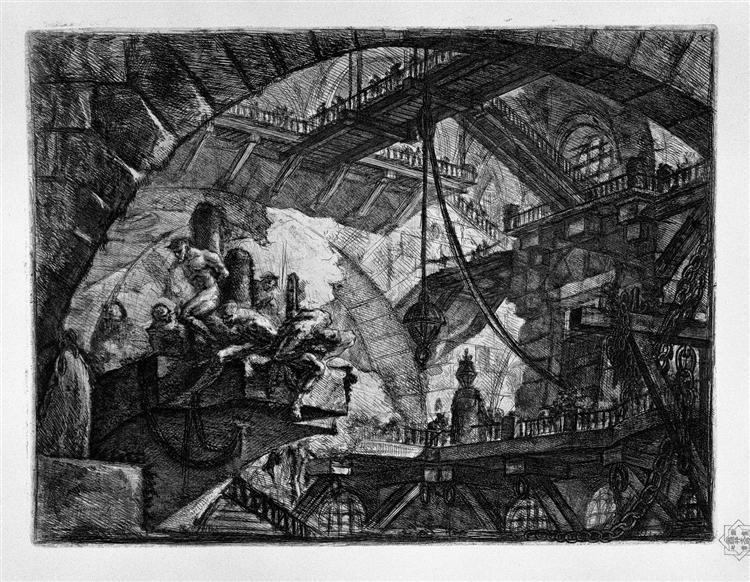
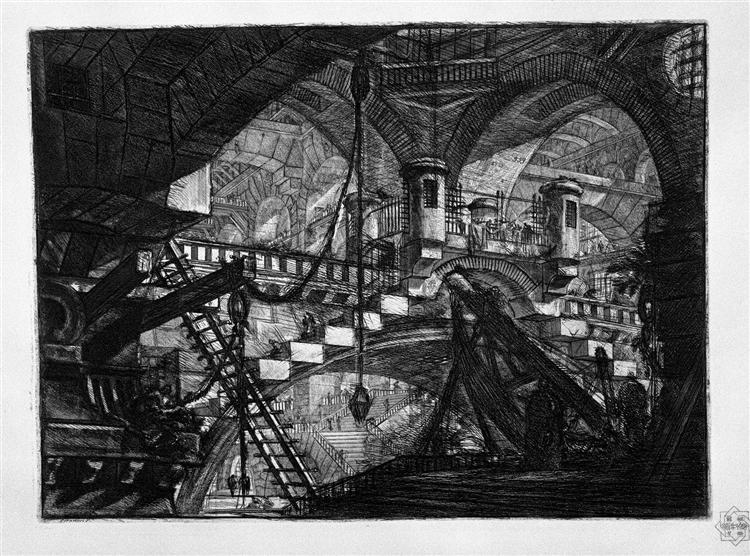
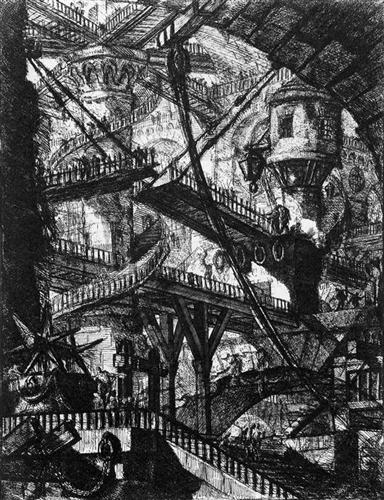
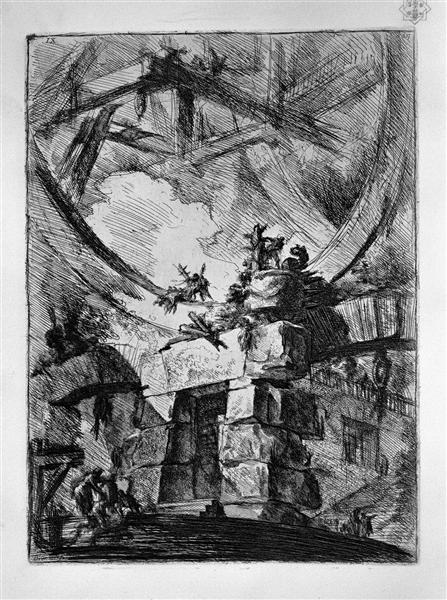
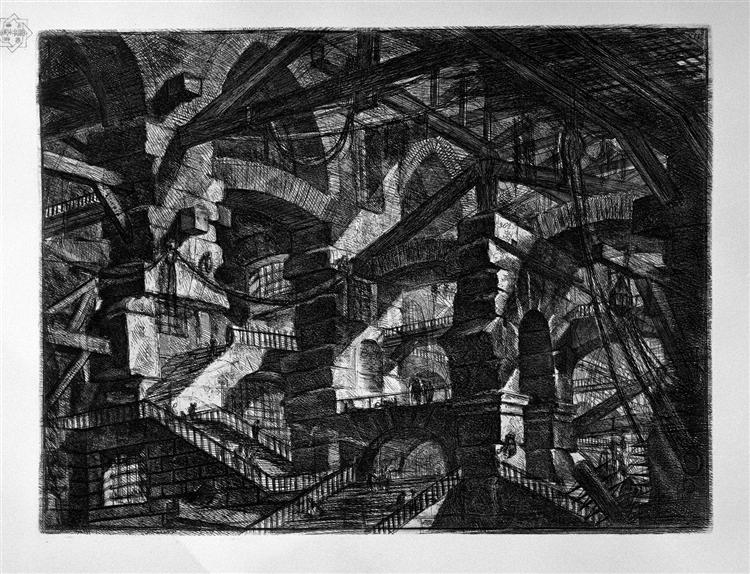
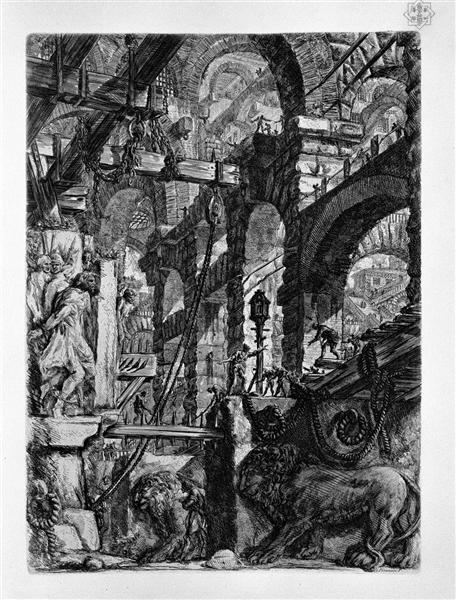
Again, I recommend looking at all 16 of them, they're really extraordinary: http://www.wikiart.org/en/giovanni-batt ... nesi#close
There's a series of etchings by Italian wonder artist Giovanni Battista Piranesi called Carceri d'Invenzione, and I think they just might be the 18th century, Italian, architectural-focused, traditional art equivalent of Neverending Nightmares.
In case you've never heard of him, Giovanni Battista Piranesi is quite possibly the greatest wood engraving artist of the 18th century, and greatest architectural artist to have ever lived. The drawings he did of ancient ruins and cityscapes have had tremendous influence in the fields of archaeology, history, science, and art. His art pretty much speaks for itself, and if I could just dump hundreds of his pictures in high resolution here I would, but I can't really, so I highly recommend that you take a look here: http://www.wikiart.org/en/giovanni-battista-piranesi for a super-hi-res gallery of all his work.
Anyways, the reason I bring it up is because I appreciated his work before, but I heard from one of my art history professors that some scholars are starting to believe he might have had OCD. And, looking at his work, it certainly seems plausible. He obviously put an obsessive amount of effort into each of his architectural drawings. Everything - EVERYTHING - is detailed. The perspective, light, and shadow, are perfect. You can make out the textures of each surface. He would often go to the sites and measure the ruins by hand so that the proportions were perfect as well. There's something indescribable about his pictures that make them immensely satisfying to look at. Maybe it's all the straight, angular lines, or the repeating patterns, but I can easily see them being the handiwork of someone with OCD. What's truly amazing is how large his body of work is, despite his perfectionism.
So, in this discussion, they were talking about his perfectionism, but suddenly I thought of Carceri, and noticed that nobody was bringing it up. At some point in his life, he did a 16-picture series called Carceri d'Invenzione, or Carceri for short. It's a series in the Capriccio genre, which is something he's largely credited with inventing, about making pictures of architecturally-focused fantasy landscapes, usually by taking multiple real-world buildings and structures and putting them in the same place together. For him, the concept of Carceri was to take all of his favorite architectural features and mish-mash them together for purely aesthetic purposes and no regard for practicality or the laws of physics. He could have made it anything. He could have made a city, a cathedral, a palace, someplace nice. He chose to make it a prison. If he really did have OCD, then suddenly that artistic decision perhaps doesn't seem so random. He could have made his most idealistic architecural dreamscape literally anywhere, but he chose to make it a massive, surrealistic prison complex that spreads as far as the eye can see in every direction.
Perhaps after a lifetime of obsessively (and dare I say compulsively) drawing architecture, he was trying to express himself and his message went completely over everyone's heads? Maybe the imagery is based on troubling images he imagined or dreamed? Or maybe this is all just baseless conjecture? I don't know. You decide.






Again, I recommend looking at all 16 of them, they're really extraordinary: http://www.wikiart.org/en/giovanni-batt ... nesi#close